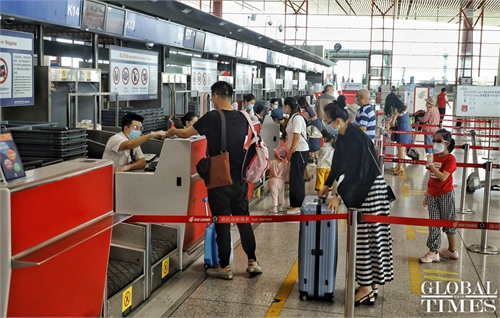SOURCE / INDUSTRIES
China remains wary of overseas travel in July: observers

Demetrio Ribes North Station in Valencia, Spain Photo: AFP
More countries are preparing to open up to foreign visitors, as the number of COVID-19 cases has been declining in some regions. However, industry insiders said it will still be difficult for Chinese to travel abroad in the short term.
The European Union is expected to reopen on July 1, and diplomats have agreed on a provisional list of 15 countries, including Canada, Japan, Australia and South Korea, that should be allowed into the EU because their levels of new COVID-19 cases meet the bloc's safety criteria, Bloomberg reported.
Chinese residents will also be allowed to visit the EU, on the condition Beijing will also allow European citizens to travel to China, the report said.
More destinations such as Dubai said earlier that tourists can visit the Arab state starting July 7, with strict guidelines for those traveling by air, and the Maldives is about to reopen to all visitors in July with no restrictions.
However, even if some countries have implemented an open policy for Chinese tourists, there is a high probability that China will not initiate organized and individual overseas travel, given the risk of overseas epidemics, and the quarantine time after returning to China, Ge Lei, vice president of China Tourism Marketing Association told the Global Times on Saturday.
Many countries have imposed different levels of restrictions on international tourism after the outbreak. Some countries only allow citizens or permanent residents to enter, while others require testing and quarantine.
As the global epidemic has not stopped and China has entered a stage of virus control, the Chinese overseas travel market in 2020 is expected to be weak, he added.
As the epidemic subsides, more countries will gradually open up air travel. China's civil aviation regulator now allows more overseas airlines to land, with Air France, Air New Zealand and Lufthansa resuming weekly services following months of suspension due to the pandemic.
However, most Chinese travelers remain cautious about overseas travel, as safety is their top concern.
A white-collar worker surnamed Li told the Global Times Saturday that she had planned to visit Europe and the US this year. But currently she canceled them because "the virus might still exist in many countries," even after learning that EU is about to welcome foreign visitors.
A tour guide in Barcelona surnamed Wang told the Global Times Saturday that he is anxious to see travelers from China, but sees dim prospects over virus control concerns.
"Even if the EU lifts its travel ban, I don't expect more Chinese tourists in the short term, as Spain has not fully controlled the virus," Wang said, adding Spain's travel industry this year may not recover, as with next year.
He has not received tourists from China in the past six months, and has started a cross-border personal shopping business to stay afloat.
The latest assessment from the International Air Transport Association shows that the outlook has worsened for major aviation markets in Europe since April. For example, passenger numbers, airline revenue, jobs at risk and the GDP impact on the five biggest European markets, including Spain, have declined. The association predicts that 983,100 jobs in that country could be at risk in June.
However, travel to Southeast Asia seems brighter as countries like Singapore and South Korea have effective virus control policies compared to EU countries.
Li said she may consider Singapore and Malaysia this year, despite the fact that she had visited them last year.
Restarting overseas travel must be based on the control of the epidemic in China and other countries, Ge said, adding that a green channel for bilateral tourism has not been ruled out, such as with Japan and South Korea.



